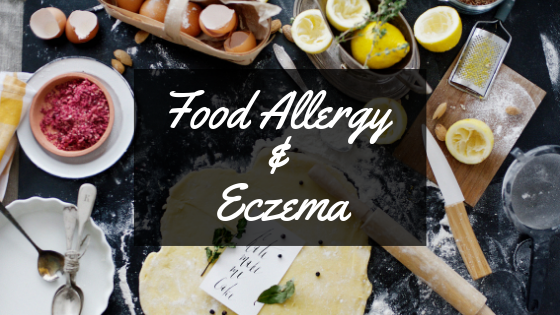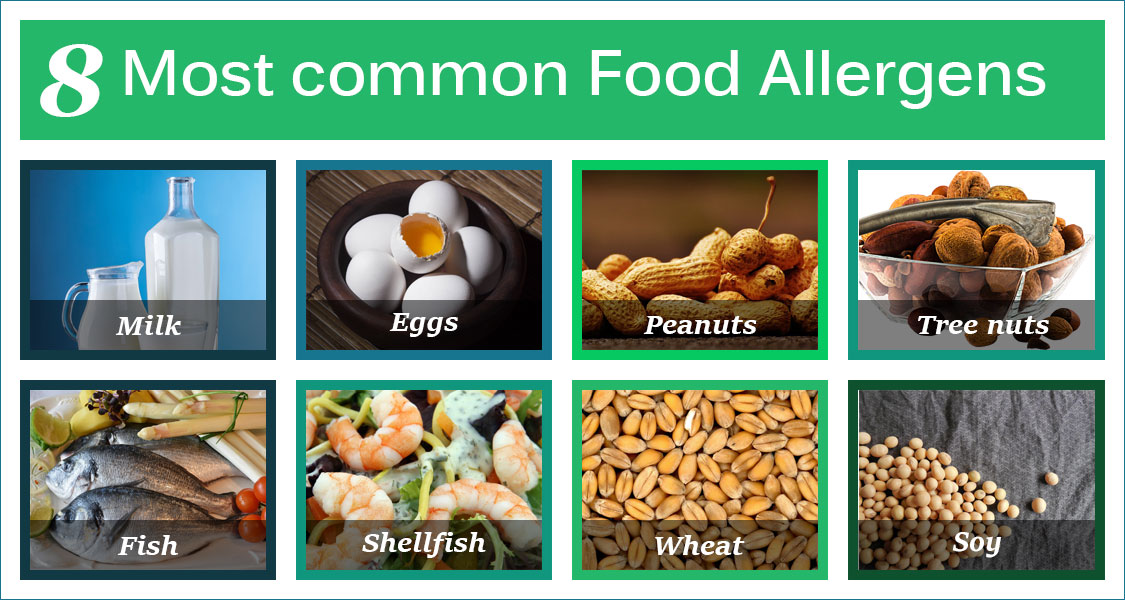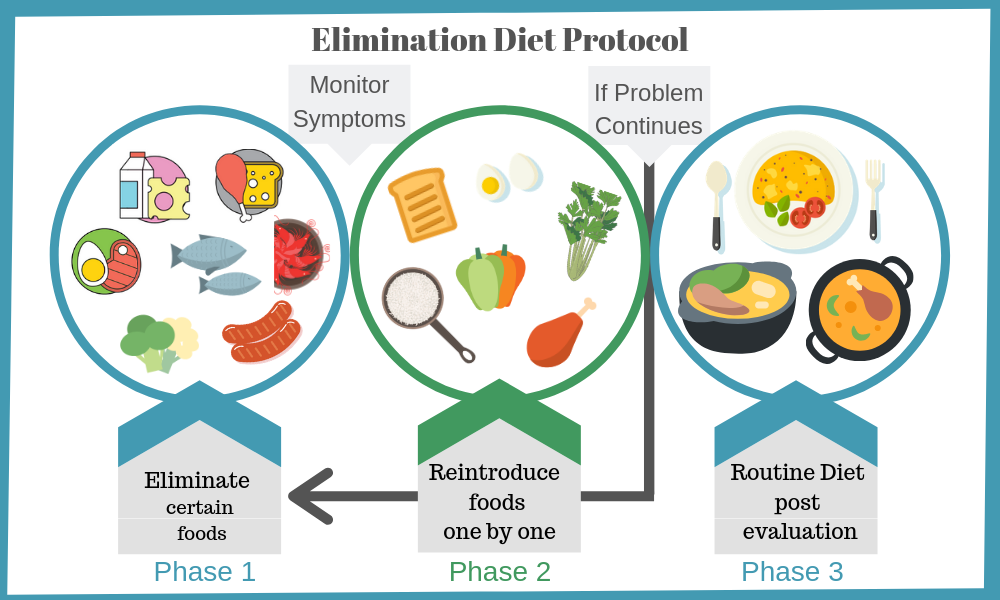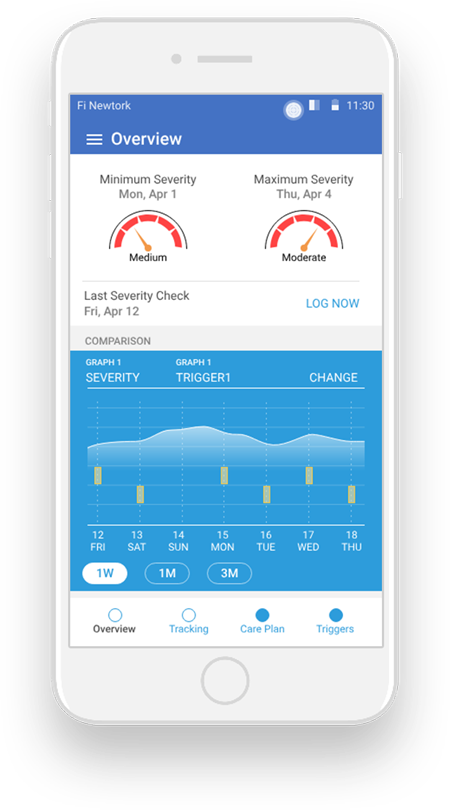Food Allergy and Eczema

Eczema is a chronic skin condition that cannot be cured and has to be managed. The main goal of Eczema management is to keep flareups to the minimum and improve quality of living. There are several triggers for Eczema but one of the most important ones is food. Typically people think that skin allergies are caused by substances that come in contact with the skin. Even though Food may not come in contact with skin, some food items are considered major triggers for Eczema.
What is Eczema Food Allergy?
Our Body’s immune system works in a way by fighting out infections and other substances which could be harmful to our good health. Food allergy is a response from the body’s immune system that occurs soon after eating a certain food. It occurs when our immune system wrongly identifies some of the proteins in the food or a substance in a portion of food as a danger, thereby, triggering a protective response. When someone is allergic to a particular food, even a tiny amount of that allergy-causing food may result in triggering the signs and symptoms of the allergy such as digestive problems, respiratory problem, swollen airways, inflammation of the skin resulting in Eczema, etc.
The body’s immune system keeps you healthy by fighting off infections and other dangers to good health. A food allergy reaction occurs when your immune system overreacts to a food or a substance in a food, identifying it as a danger and triggering a protective response.
The substances that cause allergies are called allergens. In this case, any food or its substance for which a person is allergic is an allergen.
What Causes Food Allergies?
Let’s take an example of a kid with a peanut allergy. When this kid eats a peanut-topped brownie his immune system mistakenly identifies peanut ingredient in the food as harmful and a threat to the body. In response, his immune system triggers cells to release an antibody known as IgE (immunoglobulin E) to neutralize the allergy-causing substance (allergen). Now next time when the same kid eats any substance that contains peanut or has peanut as an ingredient, IgE antibodies sense it and as a threat and signals the immune system to release a chemical called histamine, as well as other chemicals, into the bloodstream. These chemicals cause allergy symptoms.
Are Food Allergy and Food Intolerance same?
In a lot of situation people often get confused between Food Allergy and Food Intolerance leading them to incorrect treatments. Food intolerance has nothing to do with the immune system and has symptoms mostly related to bowel like bloating, gas, burping, loose stools, and others like headache, nervousness, etc. The main reason for food intolerance is because the person is unable to digest a particular substance like lactose (the phenomenon called as lactose intolerance). Food Intolerance is not as dangerous as food Allergy which may in some case be life-threatening.
Although it depends upon person to person for the kind of food allergy he has and a person can be allergic to any food, but it is found that almost 90 % of food allergy is caused by the food category Eggs, Milk, Peanuts, Tree Nuts, Fish, Shellfish, Wheat and Soy.
Track and Manage your Eczema treatment using a comprehensive Eczema App
Download Eczemaless now


 Allergies can be hereditary that means it they can be inherited from parents to their kids through genes. But it is not necessary that if one or both the parents have an allergy all their kids will have the same, it just increases the chances and many people develop an allergy even without their parents having it.
Allergies can be hereditary that means it they can be inherited from parents to their kids through genes. But it is not necessary that if one or both the parents have an allergy all their kids will have the same, it just increases the chances and many people develop an allergy even without their parents having it.
Food triggers in eczema
For sufferers of Eczema, a particular food item or multiple food items can act as triggers. Being one of the commonest triggers, food allergy often triggers a rash and a general itchy feeling, which can start the scratch-itch cycle of eczema. A sufferer of Eczema may experience a flare-up immediately after consuming the food they are allergic to. Food allergy-causing eczema is also closely related to intestinal hyperpermeability otherwise known as “Leaky Gut Syndrome”
Some of the common Food Triggers that cause eczema flares are mentioned below
Gluten and foods containing Gluten
Gluten is a protein that is commonly found in wheat, barley, rye, etc. Gluten has been shown to contribute to eczema symptoms and act as a trigger for flare-ups.
Soy
Soy and its well-known forms like tofu, soy milk, soy yogurt, soy ice cream, soy cheese, and soy flour can flare-up your Eczema as it is considered to be a common allergen for people suffering from Eczema
Sugar
Sugar and refined carbohydrates are pro-inflammatory by nature which is a contributing factor in eczema. Moreover, it is found that eczema is linked with the presence of bad gut bacteria and fungus such as Candida Albicans which thrive on sugar.
Dairy
Whether its food intolerance or food allergy the first food group that is advised to be eliminated from a sufferer’s diet are dairy products which are considered to be pro-inflammatory in the body. This is because some of the dairy products like cows milk contain large protein molecules that are difficult to digest or recognized as an allergen by the immune system
Egg
Eggs as such have no effect on eczema unless the patient has an allergy to eggs. An egg allergy can cause increased levels of histamine in the body, which leads to an outbreak of eczema.
Processed food
Processed food contains things like food dyes, additives, and preservatives which are pro-inflammatory and may cause eczema to flare. It is shockingly sad that 60% of American’s daily calories come from processed diet as per a study published in the journal BMJ Open conducted by the University of Sao Paulo.
These apart foodstuffs which are considered to be superfoods such as avocado and Brocolli are also found to worsen eczema symptoms this is due to the rich source of salicylates and other amines.
Treatment
Food can be a trigger for worsening eczema by causing flare-ups but is not the cause of eczema. This means that avoiding the food is not likely to cure eczema but will help to reduce the eczema flares. Since Eczema cannot be cured the goal is to get rid of Eczema symptoms i.e. flareups as much as possible and prevent them from happening.
Eczema treatment is multifaceted which requires multiple things to be taken care of and doesn’t depend on anyone action.
Elimination Diet



Often Dermatologists recommend an elimination diet to identify food triggers that cause eczema flares. The standard procedure is that some food items are eliminated from the sufferer’s diet and added back to the diet. For e.g., If flares seem to occur after consuming wheat, don’t consume wheat or any wheat products for a few days or weeks. Monitor your symptoms for improvement. If your eczema improves, slowly reintroduce wheat back into your diet. If symptoms return, wheat is likely an eczema trigger for you. Removing these foods from your diet could promote healthier skin.
If you think you might be allergic to a certain food, bring this up to your doctor. They can refer you to an allergist for further testing. Avoiding highly processed foods can reduce your potential for exposure, and is thought to be beneficial for overall health as well.
Keep record
A food journal or diary will be helpful to maintain the records of everything you eat as well as your symptoms over a period of time. And when you get a flare you can quickly refer your diary to narrow down a particular meal and the food you had in that meal.
It may be little hectic and too much paperwork to keep a record of your diet and symptoms with date and time but it’s the best way to identify the culprit food. Keeping record nowadays is very easy with help of an app like EczemaLess which not only helps you to keep a record of your diet, symptoms, and flareups but also your care plan, current therapy and its effect on eczema severity just at your fingertips.
Some Tips to follow
- When consuming outside food Be sure to read food labels carefully and know what you’re eating and drinking.
- While dining at restaurants be sure that your server or chef is aware that you can’t eat the food that causes you flares, and you need to be completely sure that the meal you order doesn’t contain that
- Plan your meals and snacks before when you travel or go to an event carrying a cooler packed with allergen-free food.
Eliminating certain foods and avoiding food can only prevent the flares but to keep the symptoms in check carry out your routine eczema treatment of moisturizing, applying topical ointments, etc.
Always Remember eliminating a group of food or diet restrictions can lead to poor nutrition adults and malnutrition and growth delay in babies and children. Speak with your health care provider about maintaining a well-balanced diet and keep her informed and get her approval before making a certain change to your diet.
GET IN CONTROL OF YOUR ECZEMA
Use our AI tool to check the severity of Eczema and keep track of your Eczema progress.



